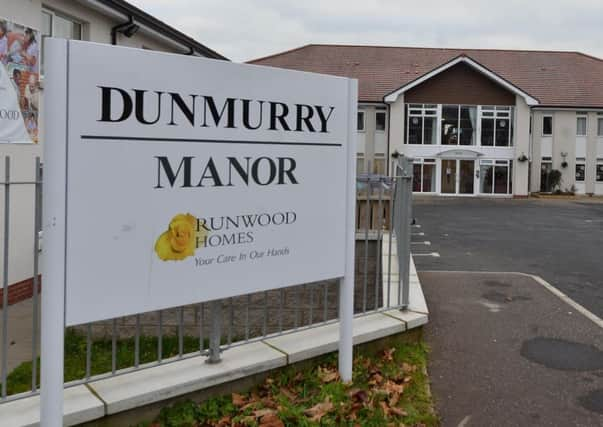RQIA chief denies body is '˜not fit for purpose' after Dunmurry Manor probe


Olive McLeod, Chief Executive of the Regulation and Quality Improvement Authority (RQIA), was speaking to the BBC after an investigation into a care home specialising in dementia on the outskirts of Belfast found residents there had suffered “inhuman and degrading treatment”.
That investigation had been ordered into Dunmurry Manor by the Commissioner for Older People after concerns were raised by residents’ families and whistleblowers.
Advertisement
Hide AdAdvertisement
Hide AdThe Commissioner, Eddie Lynch, criticised the RQIA for its failure to uncover the to uncover “the extent of the problems” despite carrying out “23 inspections in a 39-month period”.
The RQIA had hit back at the criticism in the immediate aftermath of the investigation report’s publication, saying in a statement that it “does not agree with some of the Commissioner’s conclusions.”
The Department of Health, meanwhile, has since issued a public apology and suggested a range of actions to stop care homes failing in the future, including the possibilty of “additional sanctions” for private care home operators responsible for serious failings.
Now, Olive McLeod has spoken publicly to stress that the RQIA is helping to “keep people safe every day.”
Advertisement
Hide AdAdvertisement
Hide AdShe told the BBC: “I don’t accept that we, as the regulator, are not fit for purpose and that we failed people. Because we inspect every day. We inspect homes, hospitals, children’s homes, prisons. And we help to keep people safe every day.”
The Commissioner for Older People’s report into Dunmurry Manor also highlighted the “sexual abuse” of residents living there by other patients.
Responding, Ms McLeod said: “It was reported to us, absolutely. It was patients, or clients, who were living there - clients on clients. It was not staff, it was people who were living in the home. And that is often a symptom you see in people with dementia.”
She continued: “What was reported to us was disinhibited sexual behaviour by both male and female patients and that behaviour can be a symptom of distress that you see in people with dementia.
Advertisement
Hide AdAdvertisement
Hide Ad“It was reported to the safeguarding board and it was managed. There was one particular patient that was very challenging in there.
“I don’t believe there was any sexual predator in that home. It was very distressing for those families particularly the females who were subjected to it but is also a common feature in homes.”
The former Health Minister Edwin Poots had earlier questioned whether the RQIA was carrying out its work properly.
“In my view the board (of the RQIA) have a major responsibility in ensuring that these inspections are carried out correctly, and that staff are doing their jobs correctly. I’m not sure that’s the case,” Mr Poots told the News Letter last month.
He added: “I don’t believe that they have public confidence at this moment in time.”